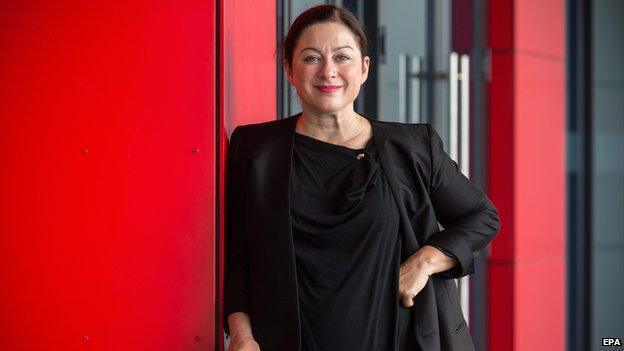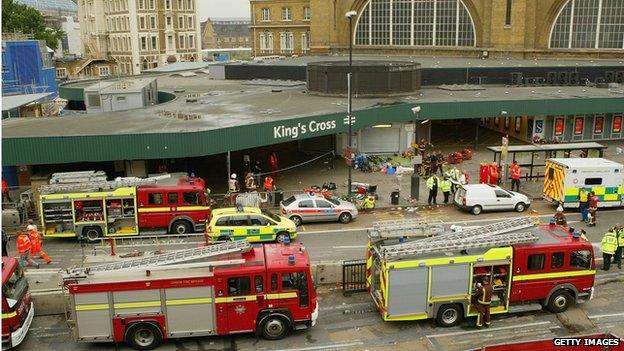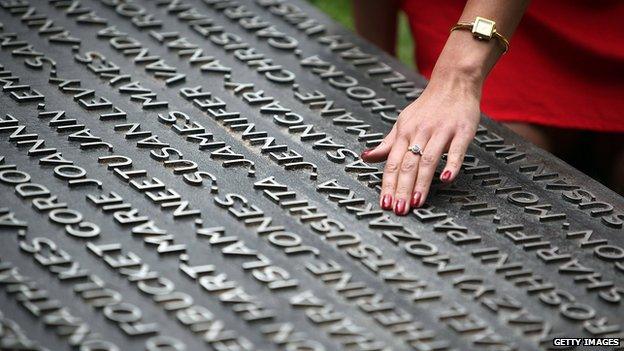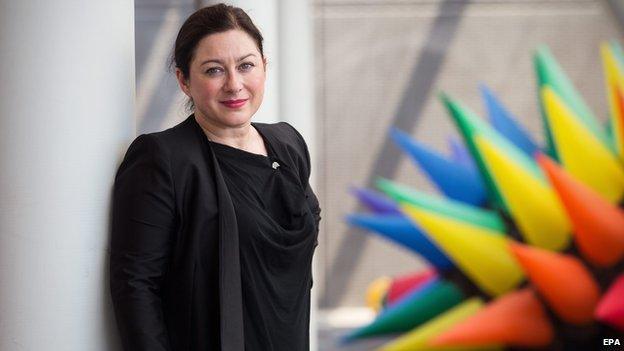The 'second life' of Gill Hicks, Australian survivor of London bombings
- Published

Gill Hicks says she still feels frustration over her injuries but is determined not to be bitter
Gill Hicks lost both legs and was close to death after she was caught in an explosion in the London underground in 2005. But her own determination and a strong empathy for the plight of others has helped her create a "second life".
Being a double amputee and victim of a terrorist attack is not without its unique brand of ghoulish humour.
This is perhaps why Ms Hicks is considering bungee jumping, walking across hot coals, abseiling, and swimming with sharks as ways to mark the decade since the 2005 London bombings.
Ms Hicks, who has been named South Australian of the Year and is a contender for the Australian of the Year award for 2015 to be announced on Sunday, resettled in her home town of Adelaide three years ago after more than 20 years in the UK.
She has decided to set herself 10 extreme physical challenges this year that will force her to face her fears.
The first, in March, will be diving with sharks. In July, she plans to abseil down one of London's taller iconic buildings. For security reasons, she will not yet say which one. She also hopes to climb the Sydney Harbour Bridge.
"What's the worst that can happen?" Ms Hicks asks. "I'm frustrated all the time, especially being the mother of a young toddler. I want to go and paddle at the water's edge like I used to, and walk on the hot sand."

The 7 July 2005 attacks brought much of central London to a standstill
Ms Hicks has taken the inevitable anger and frustration she feels at having both legs severed below the knee at the age of 37 and learned to channel it in a way she hopes will make the world a better place.
"I've managed to create a constructive anger," she says. "I'm so fortunate to have this second chance. I don't want to spend a second of that time in bitterness."
'A different connection'
Now 46, Ms Hicks was riding on a train in London's underground rail network on her way to work at 08:50 on 7 July 2005, when one of a group of four suicide bombers plunged her carriage into chaos and darkness.
She was among more than 700 people injured that morning in London. A series of coordinated suicide attacks in the city's centre targeting people on public transport during the morning rush hour killed 52 people, as well as the bombers.
"That day I changed trains and made a different connection that I maybe took three times a year," Ms Hicks recalls.

A memorial in London's Hyde Park commemorates those killed in the 7 July bombings
It is a memory that does not fade.
"There's not a moment throughout any day where I can turn off from being a double amputee," she says, and she still feels discomfort and pain every day at the point where her legs now end.
"I've had to readjust my thinking to not expect recovery because my legs aren't going to grow back," she says. "I just have to learn how to adapt otherwise I'll be stuck in a bitter mess."
Sadness and empathy
Early this year, in the wake of a siege at a Sydney cafe in which two people were killed, Ms Hicks helped establish #BeTheBridge to bring together people of different faiths to advocate for a peaceful response to violent extremism.
The initiative - more a concept than a group - made its first public statement earlier this month, when people stood hand-to-hand on the steps of the Sydney Opera House in the shape of a bridge.

Gill Hicks has been named South Australian of the year
Ms Hicks has also campaigned for global peace as a motivational speaker, and she founded the charity Making a Difference (Mad) for Peace in 2007, a not-for-profit organisation based in London which has concentrated on ending violent extremism.
"We can't ever control random acts of violence but you can control how you react and respond," says Ms Hicks.
She felt a great sadness, and then empathy, when she watched the Sydney siege, the Charlie Hebdo killings in Paris, and the deaths of many hundreds of people in Nigeria at the hands of Boko Haram unfold.
Violent extremism, she says, is a parasitic cancer that seeks out a host. "And what we're looking at right now is that [that] host is Islam."
Since her "second life" began nearly 10 years ago, Hicks has been married, divorced, fallen in love, moved countries, written a book, obtained an honorary doctorate, and given birth to a baby girl.
As part of her nomination for Australian of the Year, she has submitted the briefcase she was carrying when the bomb exploded to Australia's National Museum. It includes a print-out of her diary for the upcoming week, splattered with ink, a diary that belongs to a different Gill Hicks.
"The presumption [was] that I'm going to be doing all this stuff the following week," she says. "At 08:50, everything as I knew it ended."